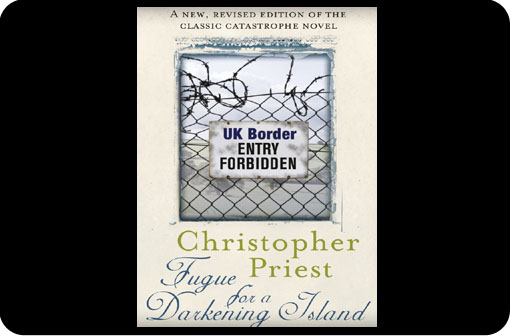
Author: Christopher Priest
Publisher: Gollancz
Out now
Before The Separation, before The Prestige, before even Inverted World, Christopher Priest produced a novel little-known, and long out of print. Fugue For A Darkening Island is almost 40 years old, as of 2011, so perhaps it’s little surprising that “as time went by sensibilities about the subject matter began to change, attitudes to it changed, even the vocabulary of it changed. The story, which I saw as an attempt to describe a global disaster in the ironical and liberal terms of its day, gradually became misunderstood.” (p.viii) The vagaries of time can be cruel and unusual indeed.
Evidently, however, the changing perception of Fugue For A Darkening Island has weighed somewhat upon its author’s mind, for in the introduction to this thoroughly revised edition Priest cites two separate reviews of his second novel – published years apart in the pages of the same magazine – which fell on opposite sides of the critical divide. To hear the author tell it, in one, a critic contemporaneous with Fugue For A Darkening Island’s initial release praised Priest for his progressive and insightful perspective, whilst in the other, Time Out bemoaned this award-nominated sophomore sojourn as an irrelevance of the right-wing.
It is a rare thing for authors to have either the opportunity or the inclination to return to old haunts and attempt to bring them up to date, but Priest has done exactly that with Fugue For A Darkening Island. A short novel about the end of the world by way of mass immigration from the devastated African continent, it is assuredly a more palatable narrative by modern standards than it was in lieu of these revisions, poised now to win over a whole other generation, but do not mistake me: by the same token, Fugue For A Darkening Island is still a story very much of its era.
And I wouldn’t have it any other way.
Priest’s very English apocalypse begins insidiously, as all things English do. First, with racism on the rise in response to fears over African émigrés running amok on our purportedly unspoiled shores, the British electorate installs a neo-nationalist government sure to be the ruin of the nation. Shortly thereafter, “cinemas showing films with explicit scenes of the physical act of love raided by the police,” (p.12) and in the following weeks and months certain other freedoms are impinged upon. Yet the people agree that these are easy sacrifices to swallow, presuming they prove fit for purpose: namely in positioning the United Kingdom to stave off the two million refugees who are forcing landings and subsequent social upheavals all over the globe.
Alas, all does not go according to plan. As per the time-honoured tradition, “Most of those ordinary British people, tolerant in outlook, dealt with their fears by looking away, hoping the problem would sort itself out,” (p.57) but – who would have thought it? – it does not. In fact the splinter parliament’s policies serve only to exacerbate the problem. England’s borders are crossed with little incident, and soon “the sea threw up hundreds of dead with every tide,” (p.44) to the high-tea horror of a populace hideously ill-equipped for the civil war which follows.
Amongst those folks most affected by the Afrim invasion: Alan Whitman. Husband, father and lecturer, Alan is also a serial adulterer – an all-round middle class man, then – more troubled in the collapse’s early stages by performance-related anxiety (see p.13) than the death of millions of innocents. All that changes when guerillas force him out of his home, and affect a violent separation from his family. Finding himself personally slighted, Alan becomes “involved in a sequence of events that no one had expected and that no one now was able to stop.” (p.61) Quite against his better judgement, needless to say.
Fugue For A Darkening Island divides its unchaptered narrative into two parts. In the first, we are with the Whitmans as society dissolves around them, and they take to the countryside hoping to wait out the catastrophe in progress. In the second, set sometime later, Alan is down one wife and one child, and travelling with a band of fellow foragers as the war rages on. Respectively, these threads work to chronicle how the world came to be so changed, and latterly how Alan Whitman and his precious principles have weathered – or not – the storm.
Fugue For A Darkening Island is a minor work, admittedly, but a minor work from a major talent, for Priest – whose every new novel is an occasion for celebration, as The Islanders is sure to be later this year – has long been amongst the science fiction genre’s most literary proponents. That said, Fugue For A Darkening Island has its issues, even in this updated edition. Foremost among them, there is a certain emotional coldness to the narrative in both its formulations; a “cool detachment” (p.ix) which, though typical of its time, is sure to make Alan Whitman a hard man for some readers to sympathise with. Indeed, Priest’s voice is as distant during the more personable half of the whole as it is during the broad strokes worldbuilding which makes up the remainder of this novel’s 200-some pages.
On the other hand, this coldness also cuts to the heart of the matter entire, for Fugue For A Darkening Island‘s single most significant theme is the idea that we Brits are as a people no more in touch with ourselves, and our own feelings, than we are with the world around us. To which I say: fair point.
In truth it is startling how relevant this 40 year-old novel is, even today. From the current state of affairs in government to the institutionalisation of nationalism by way of the BNP, and from the catastrophic struggle over oil to the deep recession we – as with the United Kingdom of Fugue For A Darkening Island – are in the midst of, Priest’s novel is positively prescient in its foretelling. So too is it considered a classic for good reason. Even at this early stage, the esteemed author seems as much a contemporary of Ian McEwan and Cormac McCarthy as he does the usual sci-fi suspects. His prose is finely honed, his grasp of structure and tone a thing of darkly sparkling beauty, redolent of an elegance, a grace, even in its most stilted moments.
At the very least, this revised edition of Fugue For A Darkening Island makes for a fascinating study of how Britain and in particular one middle-class white British male in the 70s might react to the end of the world as we know it. And in the final summation, I do not know that we are a great deal changed.








